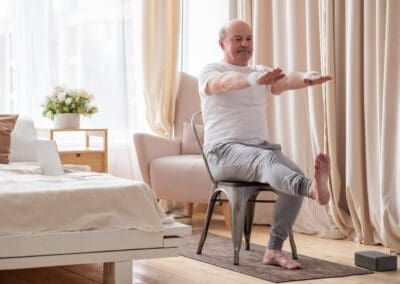Every 40 seconds, someone in the U.S. has a stroke. It might start with a sudden severe headache. You might feel weak or numb on one side of your face or body. Some people have trouble speaking or understanding speech. Others notice blind spots in one eye.
Many people ignore the signs of stroke because they think it’s a result of stress or exhaustion. But the longer you wait to be seen by a doctor, the greater the risk of serious long-term disability.
Know the Early Warning Signs of Stroke
When you suffer a stroke, it means either a blood clot is interfering with blood flow to your brain or a weakened blood vessel in your brain has ruptured. In either case, the result is the same: Brain cells are starved of oxygen and suffocated.
The sooner you can receive treatment, the better your chances for recovery. It’s why doctors who treat strokes say that “time is brain.” In other words, time wasted is brain lost. That’s why it’s vital to learn the warning signs of stroke and get immediate medical attention if they occur.
Act F.A.S.T. to Help Stroke Victims Get the Treatment They Need
F.A.S.T. is an acronym that can help you remember and recognize the signs of stroke. If you see someone experiencing any of these stroke symptoms, call 911 immediately. Getting treatment within 60 minutes can prevent disability.
F stands for Face
- Is there anything abnormal about the patient’s face?
- Is their smile drooping?
- Is their eyelid drooping?
- Ask the person to smile. Is their smile uneven or lopsided?
A stands for Arms
- Is one arm weak or numb?
- Ask the person to raise both arms. Does one arm drift downward?
S stands for Speech
- Are they slurring their words?
- Is the person unable to speak or hard to understand?
- Ask them to repeat a simple phrase like: The grass is green. If they can’t repeat the phrase, the higher the chance of stroke.
T stands for Time
- If you see any of these signs, even if the symptoms go away, call 911 and get the person to a hospital right away.
What are Other Early Warning Signs of Stroke?
- Sudden numbness or weakness of the face, arm, or leg (especially on one side of the body)
- Sudden confusion, trouble speaking or understanding speech
- Sudden trouble seeing in one or both eyes
- Sudden trouble walking, dizziness, loss of balance or coordination
- Sudden severe headache with no known cause
How Do Doctors Treat a Stroke?
If your stroke was caused by a blood clot, there are drugs that can break up the clot. If the clot is broken up quickly enough, your symptoms may go away completely. However, the drugs must be given within the first few hours following a stroke.
If your stroke was caused by a ruptured blood vessel in the brain, doctors focus on controlling the bleeding and reducing pressure in the brain caused by the excess fluid.
Reduce Your Risk of Stroke
Being overweight, not getting enough exercise and drinking too much increase your risk of stroke. By making healthy lifestyle changes, you can reduce your risk of stroke by up to 80%.
1. Eat healthy – High blood pressure and high cholesterol increase your chances of having a stroke. Limiting salt in your diet can lower blood pressure. Eating foods low in saturated fats, trans fat and cholesterol, and high in fiber, can prevent high cholesterol. Include plenty of fruits and vegetables in your diet, and choose healthy sources of protein, such as beans, nuts and fish.
2. Stay active – Being physically active can help you lose weight and keep your cholesterol and blood pressure at healthy levels. The Surgeon General recommends 150 minutes of moderate physical activity each week. Going for a brisk walk or climbing stairs are easy ways to get your exercise in and reduce your risk of stroke.
3. Don’t smoke – Smoking damages the heart and blood vessels. If you don’t smoke, don’t start (and avoid second-hand smoke). If you do smoke, there are nicotine patches and prescriptions that can help manage withdrawal symptoms. You can also get help by calling 1-800-QUIT-NOW or by talking to your doctor.
4. Drink less alcohol – Drinking too much alcohol can increase blood pressure and cholesterol. So if you do enjoy a drink now and then, do so in moderation: no more than two drinks a day for men and one a day for women.
Your Health is Our Top Priority at Sedgebrook
From healthy dining options to personalized exercise programs to having a medical practice on-site for preventive screenings, Sedgebrook residents have everything they need to lead an active, healthy life. But if illness or injury means a trip to the hospital, residents know they can get the specialized therapy they need at our on-site rehabilitation center, Radford Green. To learn more about the top-rated care available at our health center, get in touch.



